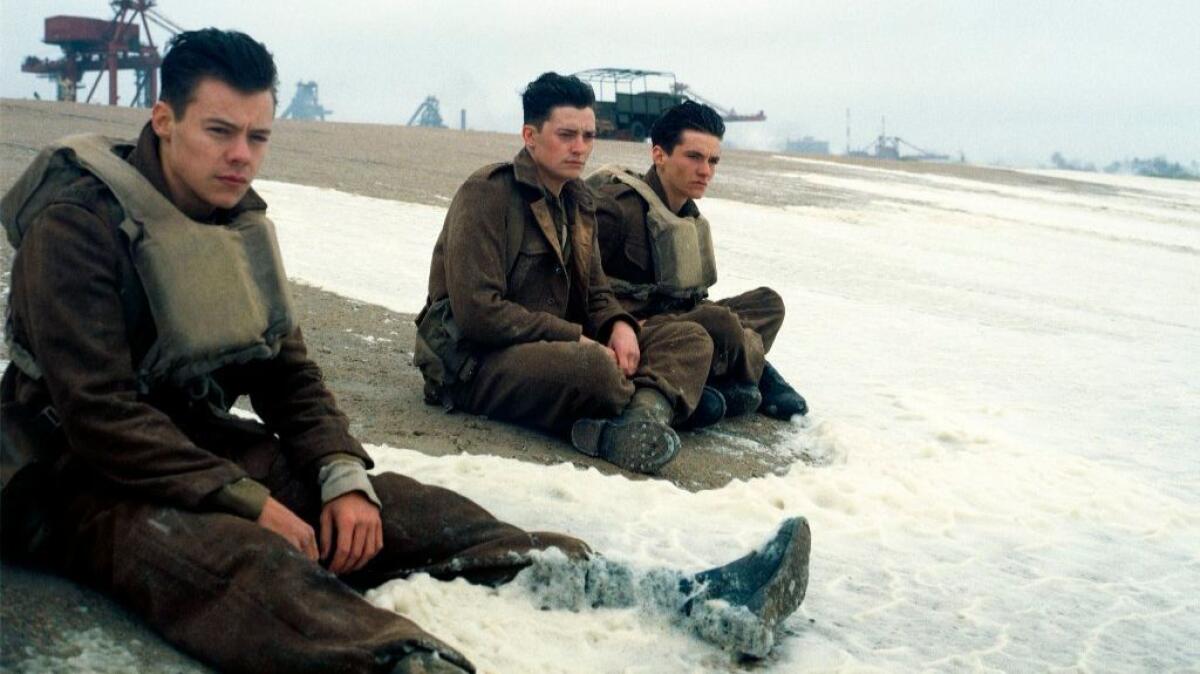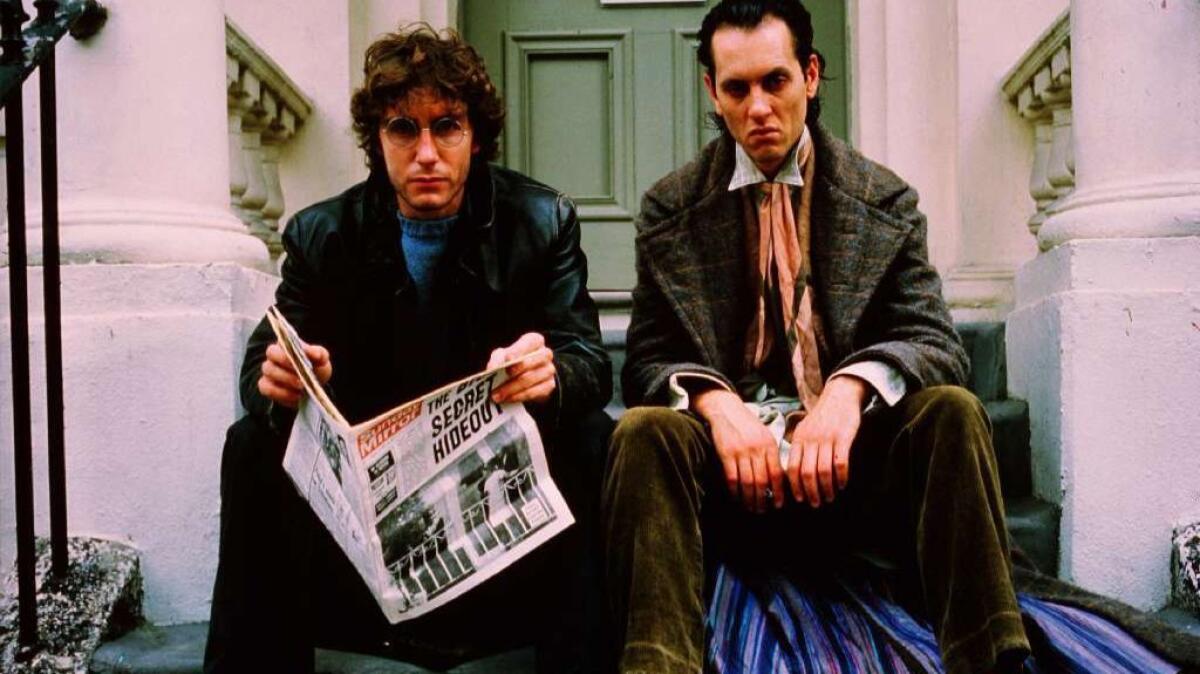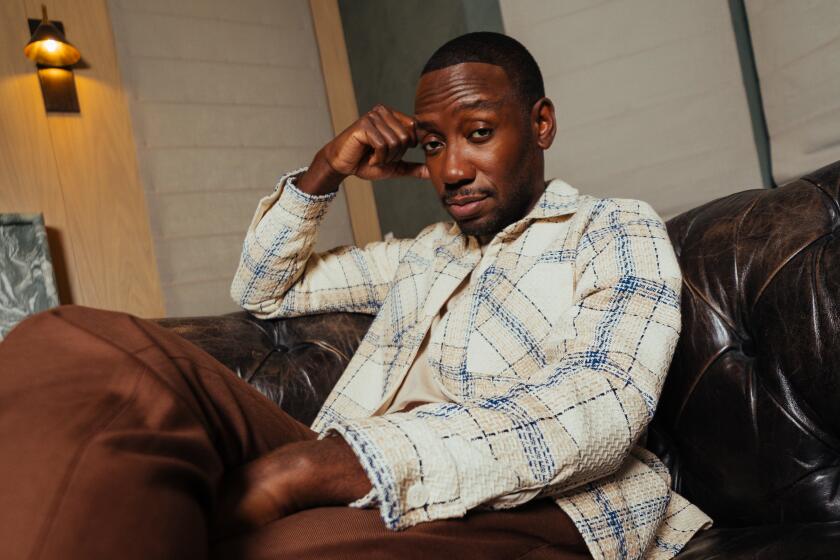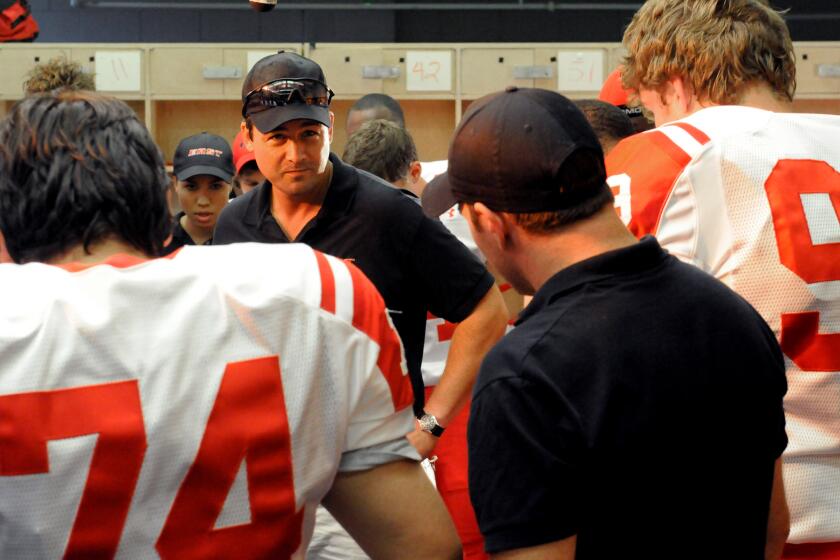Q&A: Christopher Nolan on the power of the people and why ‘2001’ should be required preschool viewing

Christopher Nolan has become a brand-name director and has captured audiences with psychological thrillers such as “Memento” (2001) and“Inception”(2010). (Jan. 5, 2018) (Sign up for our free video newsletter here http://bit.ly/2n6VKPR)
Christopher Nolan’s office on the Warner Bros. lot is a stone’s throw from Clint Eastwood’s Malpaso Productions bungalow. Nolan has never popped his head in to say hello to Eastwood (“far too daunting”), and, besides, he pretty much just uses the studio space to take meetings and store an inordinate number of Batmobile models of various vintages and sizes.
The 47-year-old filmmaker, clad in his familiar sartorial uniform (blue dress shirt, gray waistcoat, navy jacket), takes a seat behind his desk on a mid-November day, mug of Earl Grey tea at the ready. (He’ll go through two cuppas in the course of an hourlong conversation.) His latest film, the 10th of his career, “Dunkirk,” took in $525 million worldwide, which would be a surprising figure if anyone else had made this blockbuster.
But Nolan has become a brand-name director by challenging audiences’ expectations for big-budget Hollywood fare. With “Dunkirk,” he did so by weaving together three narrative strands, hopping from land to sea to air and jumping back and forth in time, to tell the story of the World War II evacuation of British forces from the beaches of northern France. The movie manages to be both epic and intimate, complex in its craftsmanship but sincere in its storytelling.
Before it opened, Nolan publicly fretted that his run of blockbusters — including the “Dark Knight” trilogy, “Inception” and “Interstellar” — might come to an end. Now, several months later, he chuckles, thinking about people who say its success was assured from the start.
“Hollywood culture absorbs everything new,” Nolan says. “Everything is always inevitable.”

Would you say “Dunkirk” is your most hopeful film?
Well … yeah. “Interstellar” is pretty hopeful. But then again, the whole world has ended. There is that. [Laughs] I try not to be too self-conscious about these things when I’m making the film. If I could articulate everything in simple terms, I wouldn’t need to make the film.
But now that I look back on the finished film, what it is for me, it’s about the Dunkirk experience. It’s about the idea of community, what we can achieve together, as opposed to this cult of individuality that we live in right now. Whether you’re talking about Silicon Valley billionaires or politicians, I think we’re living in an era that over-prizes individuality at the expense of community. It’s the Silicon Valley billionaire as opposed to the union. We’ve steered too far in one direction. We need to be reminded of the potential of what we can do together.
WATCH: Video Q&A’s from this season’s hottest contenders »
We had a situation recently where Disney banned Times writers from press screenings. Disney rescinded that ban after a number of film critics associations banded together, saying they wouldn’t consider Disney’s films for awards until the ban was lifted. And it was lifted almost immediately.
That’s outstanding. And that’s the thing. It’s become very fashionable in the last couple of decades to forget what good government can do, what good union organizing can do. The idea that benevolent capitalists will just take care of us and the people on top will magically distribute wealth and happiness and security to us little people … no. It’s time we wised up. Strength comes from community in all things. Dunkirk is one of those stories.

I can’t watch ‘Withnail and I’ without getting a little lump in my throat. It’s a crazy comedy, but there’s a beautiful melancholy to it.
— Christopher Nolan, on what movie makes him cry
I was a little surprised when the movie came out to discover how few people knew that story.
When we announced we were doing it, very few people knew what it was. British people knew the story quite well, but to most Americans I talked to, it meant nothing. I think it just fell off the radar after World War II receded.
Right after the film came out, with the terrible hurricanes in Texas and Florida, I saw on the news people getting in boats to help people. And I heard people refer to the “Dunkirk spirit.” And I thought, “OK. That’s something we slightly helped put back into the language and the culture.” For me, that was one of the goals. I’m not going into a film trying to … [searching for a word]
Educate?
Precisely. But I feel like this is just a great and inspiring story and the more people who know it, the better. That there’s an optimism that when the chips are down, we can achieve marvelous things. In today’s world where it feels like awful things are happening with great frequency, you feel very much a need to try to find hope. And Dunkirk is just the most substantial of those stories that I know of, on such a huge scale.
You were nervous before “Dunkirk” came out, wondering if audiences would turn up. When they did, some people wrote that the film’s success was inevitable …
It wasn’t! I was very gratified by the response to the film and hugely relieved. I took a lot of risks and did a lot of things that were outside my comfort zone with “Dunkirk.” I removed a lot of my safety nets, particularly in the screenwriting area where I’d become, I think, fairly proficient in the use of dialogue to express back story and character. And when I wrote this screenplay, I decided to remove all that and look at it in a different way. So I felt like I challenged myself and really tinkered with the fundamentals of large-scale filmmaking. And I was certainly nervous that the film wouldn’t work in the marketplace.
Now that it did work commercially, do you feel the need to push those boundaries further with your next film?
I do. [Laughs] That in itself is daunting. You bend it until it breaks. [Laughs] But I feel the response to this film hasn’t given me any reason to back off from those instincts. I always try to be sincere about it. That is to say, I didn’t change things up on this film for the sake of it. For all my films, I am the audience member. With this film, as an audience member, I wanted to be thrust into a story I had so much respect for. I wanted to be in that airplane. I wanted to be on that boat. I wanted to be on the beach with those guys. So it was in the service of that.
In the past, some critics have complained your films are too heavy on the exposition. For people who had that issue, you certainly solved that here.
Yes. I went from one extreme to the other. I think when people are critical of the amount of exposition that I’ve engaged in in my other films, it’s probably important that they take into account the complexity of the films as well. In some of those films, there’s a lot I’m trying to get across narratively. Exposition is very tough. It’s artifice. It’s theatricality. And so for me, it wasn’t about trying to get rid of exposition — Kenneth Branagh’s character is given a lot — but about removing the things that I know to be artificial and see what happens.

So the movie opens by dropping the audience straight into a tense situation with this desperate soldier running toward the beach.
That was the key. No words. No dialogue. No explanation of who’s right, who’s wrong. Just have the audience relating through physical process. Can this guy scramble over the fence before he gets shot? It’s why I love suspense films. You’re both empathetic to the character but also feeling a direct relationship with the suspenseful situation. It’s very visceral. You’re dodging the bullets yourself. I based all the story shot in the film on that cinematic language of suspense.
Have you seen “Darkest Hour” yet?
No, I haven’t. How is it?
It puts you on the other side of the Channel during the same time period. Your old collaborator, Gary Oldman, is splendid playing Churchill.
Interesting. Yeah …
I’m not sensing you’re going to run out and see it.
I love Gary. I made three movies with him and I’m pretty fascinated to see the work. But I’d be lying if I said having spent two years doing a film about Dunkirk that I want to go out and immediately see another.
You need a palate cleanser.
I do need a palate cleanser. What should I see in between?
Have you seen “Blade Runner 2049”?
I did. It was a real pleasure. I love [director] Denis [Villeneuve]. He bravely took on what he referred to as a suicide mission, following such a huge film that I was such a fan of. I thought he did a great job. Those guys really went for it. You have to admire that.
Growing up, you had a “Blade Runner” poster on your bedroom wall. Did you ever look into maybe making a sequel yourself?
No. There are a lot of movies that are on such a pedestal that to try and either remake them or follow them up would be too tricky. I have to find a way around things. So, like, “Interstellar” is very much, as people would say, in dialogue with “2001 [A Space Odyssey].” You have to find your own way around.
Strength comes from community in all things. Dunkirk is one of those stories.
— Christopher Nolan on the value of the collective
Did you do that end-around with “Dunkirk” too? Because it’s not really a war film in the traditional sense.
“Dunkirk” couldn’t be a war film for me because there are so many great war films. To address that head-on seemed impossible. But since Dunkirk is a unique story where the battle is on the perimeter, you could focus on the evacuation and the coming together of the community. Many films have expressed that idea in fiction, had their Dunkirk moment, but the real moment had not been addressed in modern movies.
You’ve said your films are Rorschach tests — they either leave you cold or move you to tears. What movies make you cry?
Quite a few. [Pause] I’m trying to think …
You’re trying to think of which films you want to own up to?
Exactly. “The Champ.” The classic tearjerker. “Get up, Champ! Get up!” I think our emotional responses to movies over decades are personal to our relationships with that film in other ways, not just the narrative itself. There’s definitely a meta level to that. Those things tend to be quite personal. I can’t watch “Withnail and I,” Bruce Robinson’s film, without getting a little lump in my throat. It’s a crazy comedy, but there’s a beautiful melancholy to it. [Pauses] There’s something really obvious I’m not remembering.

Well, I wouldn’t have expected "Withnail and I,” so I don’t know where you’re going to go. Maybe the Pixar movies? You have four kids. You must have seen those.
I’ve put in my time with the Pixar movies. I had some wonderful experiences watching them with the kids. Actually, of the animated movies, it was always “The Lion King" with the kids. It’s amazing. That’s the real peak.
I understand you showed “2001” to your children when they were very young, like 3 or 4?
I did. I think they’re able to absorb it on the most important level at a young age. That’s what happened to me. I saw it when I was 7 years old, and that’s the level I think it works the best — pure cinematic spectacle. I was extremely baffled by it, but excited by it.
When people talk about the age of people watching a film, part of what they’re asking is, “How does a 7-year-old parse the content?” And if you look at “2001” and you think about it, you can’t parse it anyway as an adult. The experience is the thing.

You don’t know what the hell is going on. You just let the experience wash over you and maybe talk about it later.
I saw “Star Wars” when I was 7, and the movie changed everything for people my age. They re-released “2001” on the basis of that success and I went to see it with a bunch of my friends. We all had the same response, like you just said. “We don’t know what the hell that means, but it’s exciting.” We just wanted spaceships, we wanted space, we wanted that experience of leaving the Earth.
That’s why fairy tales and movies like “The Lion King,” “Mary Poppins,” “The Wizard of Oz” and “2001” are not a million miles removed in terms of people’s elemental experiences of watching them when they’re young.
You’ve made a movie or two that would stamp itself on a young person’s mind.
“Inception” is the film I get the most interesting responses from young people. It sparks something about how you might see the world and what movies might do. And “Interstellar,” increasingly, is one where people have very interesting responses, where it’s meant something to them in a particular way.
What’s interesting is the later life films have. You put a film out in a very tight marketing context. You tell people, “This is what the experience is. Come and see it.” And for three or four weeks, if you’re really lucky, it’s big in movie theaters. That has a very defined feel to it. What’s interesting is the life that lingers afterward. It’s fascinating to me as a filmmaker.
That’s certainly true of a movie you mentioned earlier, “The Wizard of Oz.”
That’s one of the very famous examples. I think one of the most interesting is “The Shawshank Redemption.” When you think about the place that has in the culture now compared to when it came out … or “It’s a Wonderful Life.” That’s a really extreme version of it.
Another movie that could, perhaps, make you cry.
Very much. Definitely. I haven’t shown that one to the kids. I should show it to them on Christmas.
From the Oscars to the Emmys.
Get the Envelope newsletter for exclusive awards season coverage, behind-the-scenes stories from the Envelope podcast and columnist Glenn Whipp’s must-read analysis.
You may occasionally receive promotional content from the Los Angeles Times.







